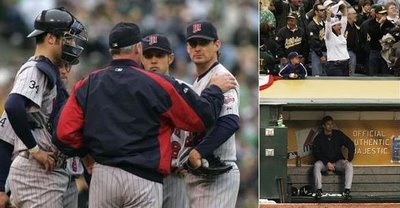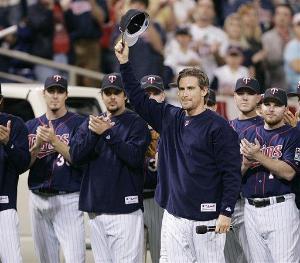December 20, 2006
Radke Retires
I'll have a lot more to say about Radke's place in Twins history once I get to his profile in my ongoing Top 40 Minnesota Twins series, so for now I'll simply say that he was without question among the best and longest-tenured pitchers in team history. Radke wasn't a great pitcher, but was safely in the "very good" category for nearly his entire career and would have won significantly more games if he hadn't gotten his start pitching in one of the least-successful periods in franchise history.
As it is, Radke finishes with a solid career record of 148-139 (.516 winning percentage) in 378 games, all but one of them starts, and logged a total of 2,451 innings with a 4.22 ERA. Among active big-league pitchers, Radke ranks 14th in innings and starts, 16th in wins, and 25th in strikeouts. He also went 2-3 with a 3.60 ERA in six playoff starts, including 2-0 with a 1.54 ERA in a first-round matchup against the A's in 2002, helping the Twins advance to the ALCS in their first postseason appearance since 1991.
 Radke's career ends on the sour note of being forced to retire due to a severe shoulder injury that he somehow pitched through for much of last season. It's possible that Radke would have retired anyway, having talked about doing so for years, but the injury forced his hand and in many ways lessened the impact of his announcement. The Twins danced around the subject, saying they'd love to have Radke back, but it was inevitable that he was done from the moment he left the Oakland mound in October.
Radke's career ends on the sour note of being forced to retire due to a severe shoulder injury that he somehow pitched through for much of last season. It's possible that Radke would have retired anyway, having talked about doing so for years, but the injury forced his hand and in many ways lessened the impact of his announcement. The Twins danced around the subject, saying they'd love to have Radke back, but it was inevitable that he was done from the moment he left the Oakland mound in October.
My final memory of Radke will be of him sitting alone in a visitor's dugout, sullen and teary-eyed, as the Twins' season came to a sudden, disappointing end and the notion of his career being over perhaps truly sunk in for the first time. After battling through a painful season and helping the Twins win their fourth division title in five years despite an awful start, Radke's shoulder let him down in his final game, showing that Hollywood endings aren't always easy to come by.
 However, that won't be my lasting memory of Radke. I'll remember his long, lanky frame in an effortless delivery that ended with changeup after changeup easing out of his right hand and freezing hitters who had been planning to tee off on his mediocre fastball. I'll remember the first-inning struggles that so often turned into late-inning success. I'll remember his painting the corners like few others in baseball history have.
However, that won't be my lasting memory of Radke. I'll remember his long, lanky frame in an effortless delivery that ended with changeup after changeup easing out of his right hand and freezing hitters who had been planning to tee off on his mediocre fastball. I'll remember the first-inning struggles that so often turned into late-inning success. I'll remember his painting the corners like few others in baseball history have.
I'll remember his odd ticks on the mound, which included blowing on his hands, raising and extending his arm between pitches, and constantly adjusting his uniform at the shoulder. I'll remember a guy who could be penciled in for 200 innings of quality pitching every year for a decade, took less money to stay in Minnesota, and was incredibly well-respected among teammates despite rarely making a public show of leadership.
I'll remember Radke as the bridge between the Kirby Puckett-Kent Hrbek-Tom Kelly Twins and the Johan Santana-Joe Mauer-Justin Morneau-Torii Hunter Twins. After World Series titles in 1987 and 1991, the Twins went through some incredibly lean years in the late 1990s and early 2000s, often with Radke as one of their few standout players. After surviving that, he was the link to and oft-overlooked contributor on a team that has emerged as one of the most successful in Twins history.
In fact, in many ways the Twins' current approach to pitching is based on finding the next Radke. More than any other organization, the Twins acquire and develop pitchers who throw strikes and change speeds without the benefit of an overpowering fastball, a combination for which Radke is the prototype. Radke's 1.63 walks per nine innings is the lowest total among active pitchers, safely ahead of control artists like Jon Lieber (1.71), Greg Maddux (1.84), and David Wells (1.86).
 His walk rate ranked among the AL's top half-dozen every season but one from 1995 to 2006, including a league-leading 1.04 walks per nine innings in 2001 and seven other top-three finishes. If ever there was an example of why pitching is more important than throwing hard, Radke is it. His fastball often struggled to creep past 90 miles per hour, but Radke thrived anyway by relentlessly pumping strikes that were seemingly just off the plate and keeping hitters off balance with a world-class changeup.
His walk rate ranked among the AL's top half-dozen every season but one from 1995 to 2006, including a league-leading 1.04 walks per nine innings in 2001 and seven other top-three finishes. If ever there was an example of why pitching is more important than throwing hard, Radke is it. His fastball often struggled to creep past 90 miles per hour, but Radke thrived anyway by relentlessly pumping strikes that were seemingly just off the plate and keeping hitters off balance with a world-class changeup.
Drafted in the eighth round four months before the Twins became champions in 1991, Radke was the Opening Day starter in nine of his 12 seasons, giving way to Scott Erickson in 1995, Bob Tewksbury in 1998, and Johan Santana in 2006. He retires with the third-most wins in team history, behind only Jim Kaat and Bert Blyleven, and only Kaat started more games in a Twins uniform. He'll be missed, but with $60 million, a dozen years of memories, and a loving family, Radke will be just fine.

